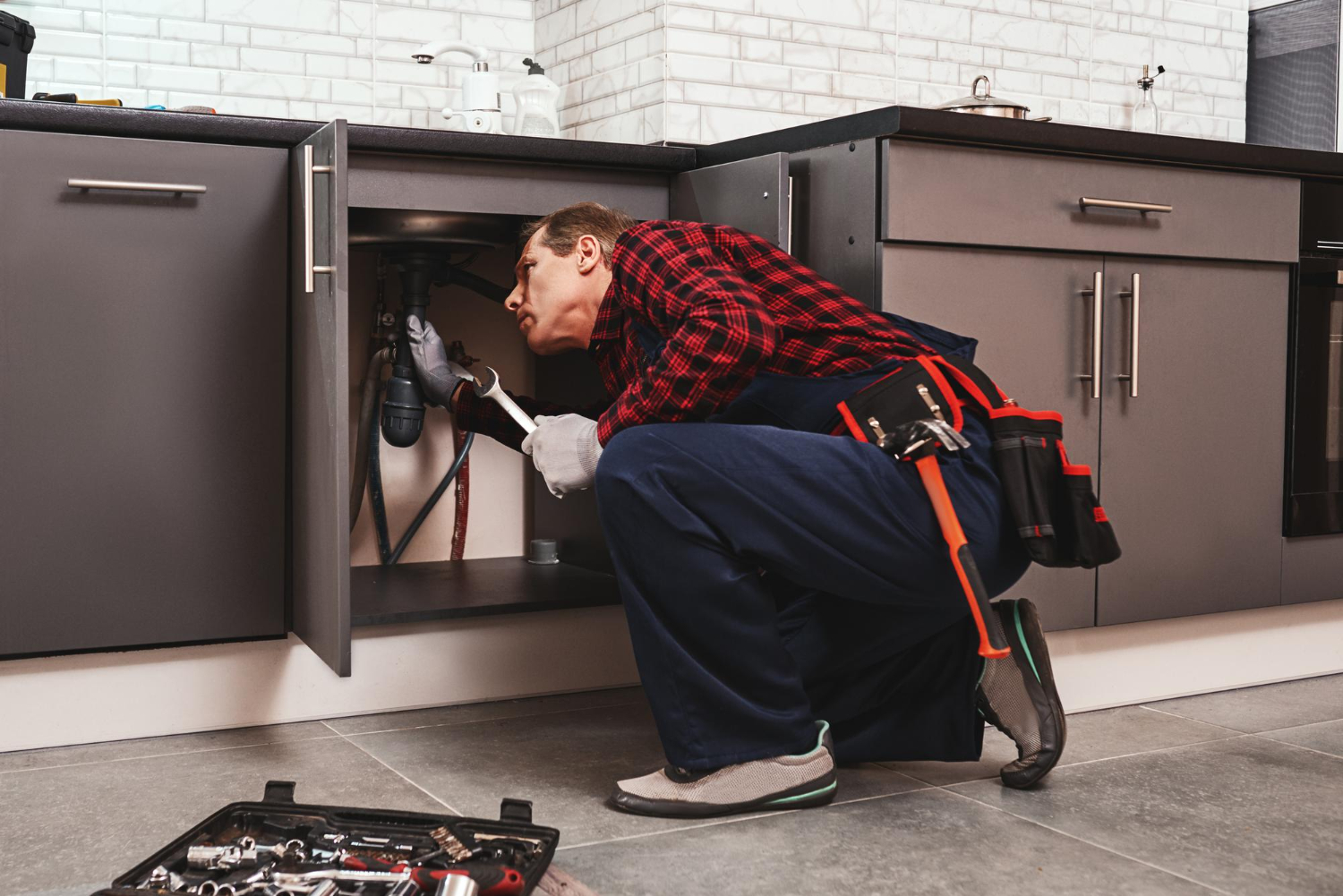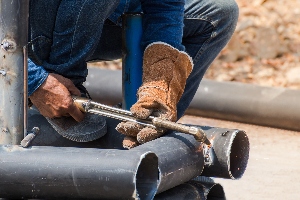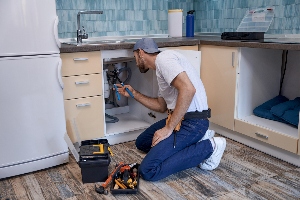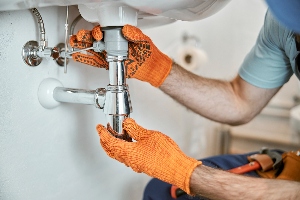Building a new home involves countless decisions, but few are as critical as choosing the right plumbing contractor. The new build plumbing contractor you select will determine whether your new home has a reliable, efficient water system that lasts for decades or one that creates headaches and costly repairs down the road.
Your plumbing system affects everything from water pressure to drainage, and mistakes during construction can be expensive to fix later.
We see many homeowners focus on visible elements like flooring and paint while overlooking the infrastructure that makes their home function. Professional plumbing installation requires expertise in planning, proper materials, and local building codes. The right contractor brings knowledge of modern plumbing techniques and helps you avoid common pitfalls that can plague new construction.
We'll walk you through what professional contractors bring to your project, how to select the right company for your area, and why investing in quality plumbing work pays off in the long run.
Here’s what you need to know:
- How the right plumbing contractor sets your new build up for success
- What to expect from a professional construction plumbing company
- Choosing a Greenville or Spartanburg plumbing company for your project
- Avoiding costly mistakes in new build plumbing
- Long-term benefits of hiring the right new build plumbing contractor
Keep reading! Understanding what makes a good plumbing contractor and how to choose one can save you thousands of dollars and years of frustration.
How the right plumbing contractor sets your new build up for success
The right plumbing contractor transforms your new build from a basic structure into a fully functional home. Expert design and skilled installation prevent expensive repairs while ensuring your plumbing systems work perfectly for decades.
Why expert plumbing design is essential for new construction
New construction gives us the unique opportunity to design plumbing systems from scratch. This means we can plan every pipe, fixture, and connection for maximum efficiency.
Expert plumbing design considers your family's specific needs. A skilled contractor maps out water pressure requirements for multiple bathrooms. They plan for future additions like extra bathrooms or kitchen islands.
Key benefits of professional plumbing design:
- Proper pipe sizing for consistent water pressure
- Strategic placement of water heaters and main lines
- Code compliance from the start
- Integration with other building systems
The design phase also saves money long-term. When contractors plan pipe routes during construction, they avoid expensive modifications later. We can run lines through walls and foundations before they're sealed.
Professional designers also consider energy efficiency. They plan shorter hot water runs and recommend high-efficiency fixtures. This planning reduces your utility bills for years to come.
How a skilled contractor prevents costly future plumbing issues
Prevention starts with quality materials and proper installation techniques. Experienced contractors use the right pipes for each application. They know which materials work best in your local climate and soil conditions.
Common future problems skilled contractors prevent:
- Pipe bursts from improper installation
- Slab leaks from poor pipe protection
- Water damage from incorrect connections
- Pressure issues from undersized pipes
Skilled contractors also follow proper testing procedures. They pressure test all lines before covering them with concrete or drywall. This catches problems when they're easy and cheap to fix.
We see the difference in warranty coverage too. Reputable contractors back their work with comprehensive warranties. They return to fix issues without charging extra labor costs.
Quality installation includes proper pipe support and protection. Contractors secure pipes correctly and shield them from damage during construction. This prevents settling issues that cause leaks years later.
The difference between hiring any plumber and a new construction plumbing company
General plumbers focus mainly on repairs and replacements. A new construction plumbing company specializes in building complete systems from the ground up. This specialization makes a huge difference in results.
New construction companies understand building codes specific to new builds. They coordinate with other trades like electricians and HVAC installers. This coordination prevents conflicts that delay construction.
New construction specialists offer:
- Experience with permit processes
- Knowledge of latest building codes
- Coordination skills with general contractors
- Specialized tools for new construction
These companies also plan for inspections at each phase. They know exactly when to schedule rough-in and final inspections. This keeps your project on schedule without delays.
We find that specialized companies often cost less overall. They work more efficiently because new construction is their daily focus. They avoid the learning curve that general plumbers face on new builds.
Construction plumbing companies also maintain relationships with suppliers. They get better prices on materials and can source specialty items quickly. This saves both time and money on your project.
What to expect from a professional construction plumbing company
A professional construction plumbing company handles complex coordination with builders and other trades while following specific installation stages. They also maintain strict quality control measures to ensure your plumbing system works perfectly from the first day you move in.
How contractors coordinate with builders and other trades
Professional plumbing contractors work closely with your builder to review building designs and create optimal plumbing layouts. They map out water supply lines and drainage systems before any pipes are installed.
Key coordination activities include:
- Meeting with electricians to avoid pipe and wire conflicts
- Working with framers to plan proper support for plumbing fixtures
- Coordinating with HVAC teams to share wall and floor space
- Scheduling installations around concrete pours and drywall work
According to Forbes Home, new-construction rough-in plumbing costs about $6,000 on average, with a typical range of $1,500–$17,500, depending on home size, access, and scope.
We expect contractors to attend regular construction meetings. They should communicate any changes or issues immediately to prevent delays.
Good contractors also coordinate inspections with local building departments. They know exactly when each phase needs approval before moving forward.
Plumbing installation stages in the new build process
Professional plumbing installation follows specific stages that align with your home's construction timeline.
The typical installation process includes:
Stage
What Happens
When It Occurs
Design Review
Plan layout and fixture placement
Before construction starts
Rough-in
Install main lines and pipes in walls
After framing, before drywall
Inspection
Building department approves rough work
Before walls are closed
Final Installation
Connect fixtures and test systems
Near construction completion
During rough-in, contractors install all pipes that will be hidden inside walls and floors. This stage requires precise measurements and proper connections.
The final stage connects all fixtures like sinks, toilets, and showers. Contractors test water pressure and check for leaks throughout the entire system.
How quality control ensures your system works flawlessly from day one
Professional contractors implement quality control measures at every installation stage. They test systems multiple times before considering any phase complete.
Quality control steps include:
- Pressure testing all water lines to find leaks
- Running water through every fixture to check flow rates
- Testing drainage systems to ensure proper waste removal
- Verifying all connections meet local building codes
We expect contractors to document their testing results. They should provide written reports showing that all systems pass required tests.
Quality contractors also perform final walk-throughs with builders. They demonstrate how all fixtures work and explain basic maintenance requirements to new homeowners.
Professional teams fix any issues they find during testing. They don't leave problems for homeowners to discover later.
Choosing a Greenville or Spartanburg plumbing company for your project
Finding the right plumbing contractor in the Upstate region requires understanding local regulations and streamlining your construction timeline. We'll guide you through the key factors that ensure compliance and project success.
Why local knowledge matters for building code compliance
Local plumbers understand Greenville and Spartanburg building codes better than out-of-town contractors. Each city has specific requirements for pipe materials, fixture placement, and inspection schedules.
Greenville code requirements:
- Specific permit processes for new construction
- Required inspections at rough-in and final stages
- Water pressure regulations for different neighborhoods
Spartanburg regulations:
- Unique septic system requirements in rural areas
- Specific fixture spacing rules
- Different backflow prevention standards
We recommend contractors who work regularly with local inspectors. These relationships prevent delays when issues arise during inspections.
Local plumbers also know which suppliers stock approved materials quickly. This knowledge saves time and money during construction.
How one call plumbing streamlines the construction process
Choosing a single plumbing company for your entire project reduces coordination problems. We suggest contractors who handle permits, rough-in work, and final installations.
Benefits of one-company service:
- Single point of contact for all plumbing issues
- Consistent work quality throughout the project
- Easier warranty management
- Better scheduling coordination
Look for companies that coordinate with your general contractor. Good communication prevents conflicts over timeline and workspace access.
Some contractors offer design services alongside installation. This approach ensures your plumbing layout meets both code requirements and your family's needs.
Questions to ask before signing a contract
Essential questions:
- How many new construction projects have you completed in our area?
- Can you provide local references from the past year?
- What permits will you handle versus what we need to obtain?
- How do you coordinate with other trades on the job site?
Timeline and cost questions:
- What is your typical timeline for rough-in and final installation?
- How do weather delays affect your schedule?
- What materials are included in your base price?
- Do you charge extra for code compliance issues?
Always verify licensing and insurance before hiring. South Carolina requires specific licenses for plumbing contractors working on new construction.
Request detailed written estimates that break down labor and materials. This transparency helps you compare contractors fairly.
Avoiding costly mistakes in new build plumbing
New build plumbing mistakes can turn your dream home into a financial nightmare. Poor planning leads to delays, while cutting corners creates problems that cost thousands to fix later.
Common oversights that lead to expensive repairs
Water pressure issues rank among the most expensive mistakes we see in new construction. Many builders fail to account for multiple fixtures running simultaneously. This creates weak water flow throughout the home.
Inadequate pipe sizing causes major problems. Using pipes that are too small restricts water flow. Homeowners then face costly retrofitting to replace entire sections of plumbing.
Poor pipe support leads to sagging and joint failures. We've seen cases where unsupported pipes break within months of installation. The repair costs often exceed $3,000 per incident.
Incorrect slope calculations for drain lines cause standing water and backups. Fixing these issues requires opening walls and floors. The average repair cost ranges from $2,500 to $8,000.
Missing expansion joints in long pipe runs create stress fractures. These small oversights result in leaks that damage floors, walls, and ceilings.
How proper planning keeps your project on schedule
We always start with detailed plumbing layouts before construction begins. This prevents costly changes during the building process. Early planning saves both time and money.
Coordinating with other trades prevents conflicts. Electrical and HVAC systems need space too. Poor coordination leads to expensive rework and project delays.
Material ordering schedules must align with construction phases. Running out of specific fittings can delay projects by weeks. We order materials based on precise installation timelines.
Permit approvals take time when done correctly. Rushing through permits often leads to rejections and delays. We submit complete plans that pass inspection on the first try.
Inspection scheduling requires careful timing. Missing inspection windows can push back entire construction phases. We coordinate inspections to match project milestones.
Why cutting corners in plumbing always costs more later
Cheap fixtures fail faster and void warranties. We see homeowners replacing discount fixtures within two years. Quality components last decades longer.
Using incorrect pipe materials creates compatibility issues. Mixed metal connections corrode quickly. The replacement costs often exceed the original savings by 300%.
Skipping proper insulation leads to frozen pipes and energy waste. Burst pipes can cause $10,000 or more in water damage. Proper insulation costs less than $500 initially.
Inadequate water heater sizing forces premature replacement. Undersized units work harder and fail sooner. Right-sizing equipment from the start saves thousands later.
Poor installation techniques void manufacturer warranties. We've seen $15,000 water heater replacements denied due to improper installation. Following manufacturer specifications protects your investment.
Long-term benefits of hiring the right new build plumbing contractor
Choosing the right plumbing contractor creates lasting value through increased home worth, modern efficiency features, and reliable support systems. These benefits extend far beyond installation day and impact your daily life for years to come.
How a well-planned plumbing system boosts home value
A properly designed plumbing system significantly increases our home's market appeal and resale value. Professional contractors plan pipe layouts that maximize water pressure throughout the house. They position fixtures to create efficient flow patterns that future buyers notice and appreciate.
Quality plumbing work prevents costly problems that hurt home value. When we hire licensed professionals, they install systems that pass inspections without delays or expensive fixes. This clean inspection record becomes part of our home's selling points.
Key value-adding features include:
- Consistent water pressure in all rooms
- Properly sized pipes for current and future needs
- Strategic placement of shut-off valves for easy maintenance
- Quality fixtures that last for decades
Modern buyers expect updated plumbing systems. Homes with professional installations sell faster and command higher prices than those with DIY or budget work.
Energy-efficient and water-saving upgrades for modern homes
Professional contractors install modern systems that cut our utility bills year after year. They recommend high-efficiency water heaters that use 20-30% less energy than standard models. These units pay for themselves through monthly savings.
Water-saving fixtures reduce both water and heating costs. Low-flow toilets, efficient showerheads, and smart faucets can cut water usage by 30% or more. We see immediate savings that continue throughout the home's life.
Popular efficiency upgrades:
- Tankless water heaters for on-demand heating
- Smart leak detection systems that prevent water damage
- Insulated pipes that maintain water temperature
- Pressure-reducing valves that extend fixture life
According to the U.S. Department of Energy, insulating hot-water pipes reduces heat loss and can raise delivered water temperature by about 2°F–4°F (yielding ~3%–4% annual energy savings).
These upgrades also qualify for rebates and tax credits in many areas. Professional contractors know which improvements offer the best returns on our investment.
Why strong warranties and aftercare matter for new builds
Professional plumbing contractors provide comprehensive warranties that protect our investment for years. Most reputable companies offer 2-5 year warranties on their workmanship plus manufacturer warranties on fixtures and equipment.
Aftercare service means we get priority scheduling when issues arise. Professional contractors maintain relationships with their clients and respond quickly to warranty calls. This ongoing support prevents small problems from becoming expensive emergencies.
Warranty benefits we should expect:
- Labor coverage for installation defects
- Free return visits for adjustments
- Parts replacement at no cost
- Emergency service priority
Quality contractors also provide maintenance guidance that extends system life. They teach us proper care techniques and schedule preventive services that catch problems early.
Conclusion
We cannot stress enough how important the right plumbing contractor is for your new home. Quality plumbing work protects your investment and saves money over time.
The wrong contractor can create problems that last for years. Poor installation leads to leaks, water damage, and costly repairs. You deserve better than that.
We recommend getting multiple quotes before making your choice. Ask about licenses, insurance, and past projects. Check references and read reviews carefully.
Remember that the cheapest option often costs more later. Good plumbing work requires skill and quality materials. Both cost money upfront but save thousands down the road.
Your new home deserves plumbing that works perfectly from day one. The right contractor makes this happen through careful planning and expert installation.
Take time to research your options. Ask questions about materials, timelines, and guarantees. A good contractor welcomes these conversations.
Building a new home is exciting. The right plumbing contractor helps ensure your excitement lasts long after you move in. Your future self will thank you for choosing wisely.
Request a new-construction plumbing bid with One Call Plumbing today, schedule plan review, rough-in and pressure testing, fixture set, and code inspection sign-off for your Greenville or Spartanburg build.












